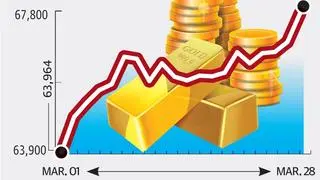Previously in this column, we discussed how changes in underlying price, volatility and time to expiry affect option price. This week, we discuss how change in interest rate impacts equity option price. As you will see, this factor is the least sensitive of the five factors (spot price, strike price, time to expiry, interest rate and volatility) that determine an option price.
Value vs Price
The Black-Scholes-Merton (BSM) model uses risk-free rate as an input to determine option value. Conceptually, this is the rate that can be earned on an asset that has no risk. The closest we can get to earning a risk-free rate in the real-world market is by investing in T-bills and government securities issued in domestic currency. Assuming we invest in such securities, how does change in risk-free rate affect option value? Note that option value is based on a model. An option price refers to the traded price of a call or a put on the NSE.
Related Stories
Mastering Derivatives: How to combine volatility bets with directional view
Know the difference in trade set-ups between European and American options when you use the strategyIf interest rate increases, a trader would prefer to buy a call option instead of buying the underlying. Why? Buying the underlying requires the trader to pay the amount immediately. Buying a call option requires the trader to pay only a small amount, the premium, to participate in the upside movement of the underlying. Importantly, the rest of the money that would have otherwise been used to buy the underlying can now earn higher interest income. That is beneficial for a call option buyer. Hence, an increase in interest rate will increase the value of a call option and a decrease in interest rate will decrease the value of a call option.
The increase in interest rate has an adverse effect on put options. If a trader sells the underlying, she will receive the sale proceeds on which she can earn higher interest income till she reinvests the amount in the market. But buying a put option means the trader will not receive the proceeds until the option is exercised, which for European options is at expiry. This disadvantage decreases the value of put options when interest rate increases.
Related Stories
Mastering Derivatives: Understanding the relation between OI and prices
Together these metrics help traders get a directional view on the underlyingThat said, there are two reasons why change in interest rates may not significantly impact an option price. One, NSE offers short-dated options. So, any change in interest rate is unlikely to have a large effect on call options. For instance, if interest rate changes by 50 basis points, the next-week 18200 Nifty call could change by one point. If interest rate increases a day after you buy the call option, the positive effect of the change in interest rate will be more than offset by the negative impact of time decay. And two, if increase in interest rate is seen as a negative factor, market participants will drive down equity prices. This will lead to decline in call price and increase in put price. Thus, the effect of change in interest rate on options will be insignificant.
Optional reading
The impact of change in interest rate on the option price is captured by the option Greek rho. For instance, the next-week 18200 Nifty call has a rho of 2.27. This means, all other factors for valuing an option remaining the same, one percentage point increase in interest rate will increase the option value by 2.27 points. The effect of rho on option price will be greater for long-dated options. If 18200 Nifty call were a one-year option, its rho will be 109.
Related Stories
Mastering Derivatives: Know these rules to capture time decay
Time value of an option consists of time to maturity and implied volatilityIf a stock price falls when interest rate increases, the price of a call option on the stock will decline. This can be attributed to the dominating negative effect of delta and theta on a call option over the positive effect of rho and gamma. The upshot? You must be mindful of option delta, theta and vega rather than rho when trading options.
The author offers training programmes for individuals to manage their personal investments










Comments
Comments have to be in English, and in full sentences. They cannot be abusive or personal. Please abide by our community guidelines for posting your comments.
We have migrated to a new commenting platform. If you are already a registered user of TheHindu Businessline and logged in, you may continue to engage with our articles. If you do not have an account please register and login to post comments. Users can access their older comments by logging into their accounts on Vuukle.